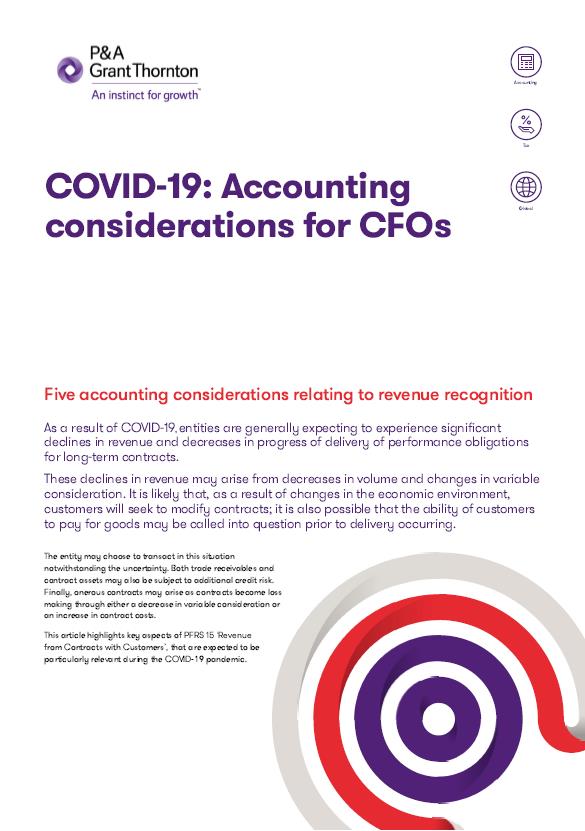This Accounting Alert is issued to highlight key aspects of PFRS 15, Revenue from Contracts with Customers, that are expected to be particularly relevant during the COVID-19 pandemic.
Background
As a result of COVID-19, entities are generally expecting to experience significant declines in revenue and decreases in progress of delivery of performance obligations for long-term contracts. These declines in revenue may arise from decreases in volume and changes in variable consideration. It is likely that, as a result of changes in the economic environment, customers will seek to modify contracts; it is also possible that the ability of customers to pay for goods may be called into question prior to completion of a performance obligation.
The following key aspects of PFRS 15 are addressed in this alert.
Five Accounting Considerations
- Applying the '5 step model'
In the current economic climate, entities may more often enter into contracts with customers with a high risk of non-payment. If collecting the consideration is not probable at contract inception, the normal PFRS 15 guidance does not apply. Instead, the supplier recognized revenue only if/when it collects the consideration and has no remaining obligations to perform. Moreover, if the customer's ability to pay deteriorates significantly while the contract is still in progress, the entity should reassess whether collection is probable.
- Variable consideration
Management's assumptions concerning variable consideration (based on facts and circumstances at the reporting date) will need to be reviewed in the context of COVID-19. A significant reversal of revenue is possible as these considerations (e.g., rights of return, price concessions, performance bonuses, penalties, volume-based variable pricing) are remeasured, which may result in negative revenue in the current reporting period.
- Contract modifications
The COVID-19 pandemic may result in entities having to renegotiate customer contracts. Depending on the type of modification, contract modification accounting may apply. Where a customer encounters financial difficulty or reduced demand, it may request a contract modification to alter the scope of the contract. If the scope of the contract decreases, or the scope increases but pricing does not change by the stand-alone selling price of that increase, contract modification accounting is applied.
- Recoverability
PFRS 15 also requires an entity to recognize revenue from contracts only where the customer is expected to meet its obligations under the contract. Though management would continue to supply to the customer, revenue should only be recognized when it is probable that the customer will be able to pay the transaction price. In such an instance, the entity should defer recognition of any revenue until collection becomes probable. The costs to fulfill the contract cannot be deferred and should be recognized as incurred as they are not ‘expected to be recovered’.
- Onerous contracts
Entities must consider whether any of their contracts may have become onerous due to the downturn in the global economy as a result of COVID-19 or an increase in costs to fulfill a contract that may arise from the effect of COVID-19 on working practices. In addition, an entity should review contracts to determine if there are any special terms that may relieve either party to the contract of its obligations under it (force majeure).
See attached Accounting Alert for further details.

